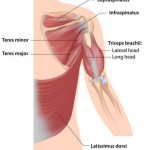Shoulder Impingement Syndrome 
There are a few structures that are commonly impinged in the shoulder. The rotator cuff and the bursa are by far the most common. The Rotator Cuff consists of 4 muscles. When the rotator cuff muscles are repetitively pinched they can progress from tendonitis (inflammation of the tendon) to TENDONOSIS (scarring and thickening of the tendon). Repetitive overhead movements are notorious for causing Impingement Syndrome. Some classic examples of these movements would be exercises often done in the gym such as bench presses, overhead presses, incline bench presses, upright rows and lateral raises.
- Supraspinatus – The most commonly pinched and most commonly torn of the rotator cuff muscles. The Supraspinatus is responsible along with the Deltoid for abduction.
- Infraspinatus – The second most commonly torn of the rotator cuff muscles. The infraspinatus is responsible for external rotation.
- Teres Minor – The third most commonly torn of the rotator cuff muscles. The Teres Minor also is responsible for external rotation.
- Subscapularis – The 4th most commonly torn rotator cuff muscles. The Subscapularis is responsible for internal rotation.
The Subacromial and Subdeltoid bursa can also be pinched. Patients with bursitis will often complain of pain in their shoulder at night and that it hurts to sleep on their shoulder. It is not unusual for a patient to suffer from impingement of more than one structure such as impingement of the Supraspinatus and the Subacromial Bursa. Long term impingement will result in tearing of the Rotator Cuff and possibly to Rotator Cuff Tendonosis.
What are Common Treatments for Shoulder Impingement Syndrome?
Unfortunately patients with Shoulder Impingement Syndrome believe they have Tendonitis when in fact they could have Tendonosis.
Because they believe the patient has inflammation they prescribe ineffective remedies such as Ibuprofen, ice and possibly a cortisone injection. While these may be appropriate for Rotator Cuff Tendonitis they are inappropriate for Rotator Cuff Tendonosis. Tendonosis is a condition in which your Rotator Cuff tendon has become scarred, thickened, less elastic and more sensitive to pain. It is like having degeneration not dissimilar to the degeneration of your joint associated with arthritis.
In order to effectively treat Shoulder Impingement Syndrome and Tendonosis proper diagnosis is paramount. With a proper diagnosis and effective treatment strategy can be implemented. Trying to treat Tendonosis like Tendonitis will result in failed treatment.
An accurate diagnosis can be achieved through manual testing, examination of what is causing the impingement, modification of the activities that are causing it and if necessary an MRI. X-rays are useless in diagnosing Shoulder Impingement Syndrome as X-rays only show bone and not the muscles, tendons or bursa. We begin therapy utilizing passive modalities such as
- Ultrasound – to dilate the blood vessels in your Rotator Cuff tendon and increase blood flow to the damaged area.
- ART/Myofascial Release – to again increase blood flow to the tendon and increase the elasticity of the Rotator Cuff.
- Kinesiotaping/Rocktaping – using waterproof athletic taping protocols we can effectively support the joint, muscles and tendons taking tension off the Rotator Cuff and allowing your body to heal.
- Joint Manipulation to reduce misalignments and subluxations (if warranted)
After the patient has improved and their pain is lessened we begin Active Therapy. Active therapy is introduced by means of strengthening exercises to reduce instability and the likelihood of re-injury. There are three types of muscle-tendon exercises we employ to achieve complete rehabilitation. 
- Isometric contractions – known to be beneficial for joint injury. Isometric contractions do not allow for joint movement.
- Concentric contractions – known to stimulate and repair muscle
- Eccentric contractions – known to help stimulate and repair the tendon
Strengthening exercises are necessary as well. You can be given a home video so that you may continue to do the exercises on your own unsupervised. We feel that your money and time is better spent doing something else rather than paying us to watch you exercises.
To schedule an appointment with Dr. Allen D.C. call 858-268-8525
